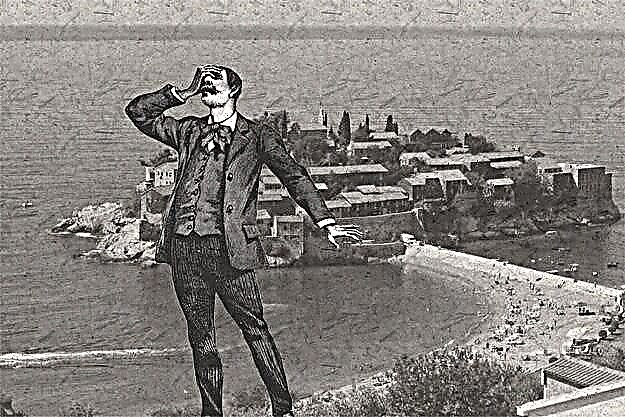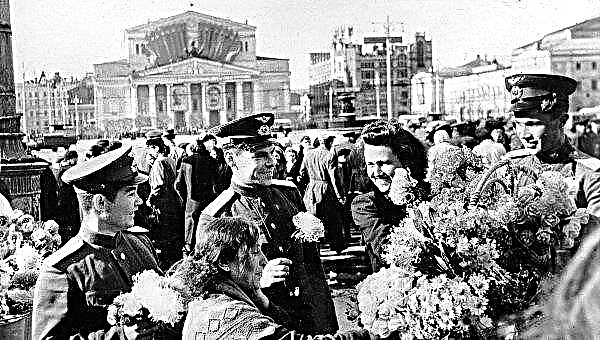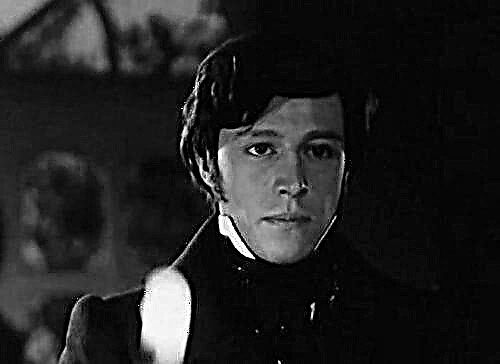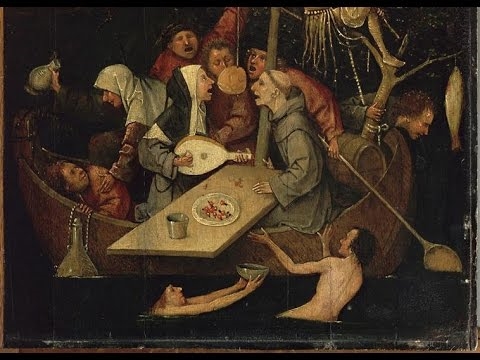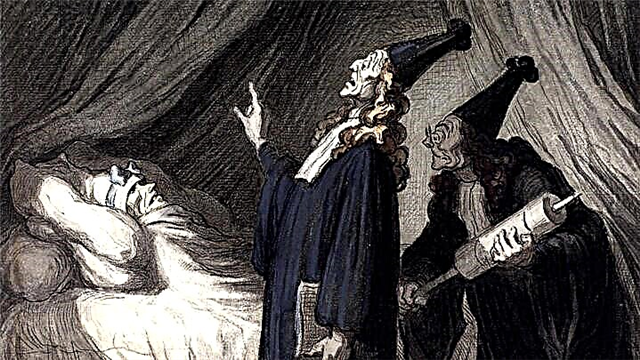The Montefosco Community Council, represented by three deputies of the community - Nardo, Cecco and Mengone, as well as two elders - Pasqualotto and Marcone gathered for a very important reason: the old Marquis Ridolfo Montefosco died, and now his son Marquis Florindo was going to take over their property accompanied by mother, widow of the marquise of Beatrice. The venerable members of the council had to decide how best to meet and greet the new gentlemen.
The deputies themselves were not much in tongue, their daughters and wives, in general, did not shine with education and upbringing, so at first it seemed natural for everyone to assign a meeting of the Marquise with the Marquise Signor Pantalone dei Bizonosi, a Venetian merchant who had long lived in Montefosco as a revenue collector the Marquis, and brought up in his house the young Signore Rosoir. But, by common sense, both candidates were rejected: Signor Pantalone - as an alien, wealthy on the sweat and blood of Montefoski peasants, and Signora Rozaura - as an arrogant person who built herself up - with full, however, and no one from the village disputed right - noble.
This very Signora Rosaura was in fact the legitimate, but fateless heiress of both the title and the possessions of the Marques of Montefosco. The fact is that the marquisate was majorate, and Rozaura’s father, in the presence of direct heirs, did not have the right to sell it. But at the time of the transaction, he did not suspect that his wife was expecting a baby, and besides, the old marquis died six months before the birth of Rozaura. The buyer of Montefosco, the late Marquis of Ridolfo, acted with the girl in honor - he gave Pantalone an impressive amount for her upbringing, education and even a small dowry, so there was nothing much to complain about to Rosaura. But when she grew up, the idea that someone else was using her title, power and money began to haunt her. Rosaura could have started the process, but it required a lot of money, and the old Pantalone persuaded the girl not to spoil the life of people who treated her nobly.
Since the castle was in disrepair, the new gentlemen had to stay in the house of Pantalone. The Marquise Beatrice turned out to be a noble and prudent lady, while her son, young Florindo, could only think of one thing - women, and the entry into the possession of Montefosco pleased him solely because among the new subjects, he believed, there would certainly be a fair number of beauties. So when the community delegates came to Florindo, he barely allowed a few words to be uttered, but when he was alone with Rosaura, he immediately came to life and, without wasting time, urged the girl not to be an idiot and quickly indulge in the delights of love with him.
By her intransigence, Rosaura was unpleasantly struck by the marquise, but he did not give up rude searches until they were put to an end by the appearance of Signora Beatrice. She put her son out, and she began a serious conversation with Rosauroi about how, to everyone's pleasure, to settle an annoying property conflict. Rosura promised to a reasonable extent to help all her undertakings, as she saw in the marquise a worthy person, in addition to her own son, who also loves truth and justice.
Having suffered a fiasco with Rosaura, Florindo, however, quickly consoled himself: in the next room where his mother put him out, an delegation of women Montefosco waited for an audience with the marquise. Giannina, Olivetta and Gitte were very pleased with the young Marquis, handsome and cheerful, each of them willingly gave him his address. Florindo also liked them all very much, which cannot be said about his mother, who was somewhat disappointed that she was met by not-too-hewn girls from the lower strata. The delegate’s definition of “from the lower layers”, amusing this to Signor Beatrice, was unexpectedly taken as a compliment - they would say, of course, they are from the valley, and not some savages from the mountains. With the Marquise Beatrice, the girls, to the best of their ability, had an exquisite conversation according to their concepts, but when Rozaura joined the society, they met her with an emphasized boorishness. The marquise took pity on the orphan, who, for all her noble birth, was forced to live in such a terrible environment, and she had a plan: to allow Rosura to lead a decent life, to stop Florindo’s frenzy and settle the dispute over her rights to Montefosco, it was necessary to marry the young marquise to Rosura.
Florindo reacted coolly to his mother's plan, but promised to think; the old, wise experience Pantalone warmly supported her. When Signora Beatrice outlined her plans to Rosaura, she angrily declared that it was absolutely impossible for her to marry a young man, who, together with village girls, sang obscene songs about her, Rosaura.
The fact is that, having escaped from his mother's instructions, Florindo immediately ran to the village and now had a good time with Dzhannina and Olivetta. Beatrice sent Pantalone to him with an order to immediately return from the village. Florindo did not begin to listen to the boring old man, although he, besides his motherly anger, promised him beatings from the side of offended village men.
On the way from Giannina with Olivetta to the beautiful Gitta Florindo, I almost ran into something worse than stick beatings. It so happened that he asked her husband Cecco, a hunter who never parted with a gun, the way to her house. This last served as a weighty argument that forced the Marquis, albeit at least in words, to agree that the wives and daughters of his subjects were not among the income due to him from the estate.
Cecco did not limit himself to not let Florindo go to his wife: making sure that he was away, he went to the council of the community, where the question of how best to entertain new gentlemen was discussed in the evening. After reporting Florindo’s unworthy inclinations, Cecco said that the community needed to do something to keep calm and piety. The first was the proposal of the young Marquis to shoot, but was rejected as painfully bloody; also did not pass proposals for the arson of the house and the accumulation of a zealous aristocrat. Finally, Nardo expressed an idea that met with general approval: it is necessary to act diplomatically, that is, to cast fishing rods to the marquise-mother.
When the village diplomats arrived at Signora Beatrice, she already managed to make a strong alliance with Rosaura: the Marquise promised the girl that she would become the heiress to the estates and titles due to her if she married Florindo; Rosura, for her part, trusted the marquise in everything and abandoned the idea of a lawsuit. The speeches of the community representatives convinced Signor Beatrice that Rosaura’s friendship was actually more necessary for her and her son than she thought: Nardo, Cecco and Mengone explained in very decisive terms that, firstly, they would stop at nothing so that stop the assassination attempts of the marquis on their women, and that, secondly, they consider only and will always consider Rosauru their legitimate mistress.
While these negotiations were going on, Florindo, disguised as a shepherd and taking Harlequin, a nearby guy, like all the natives of Bergamo, to his guide, set off again in search of the beautiful Gitta. He tracked down Gitt, but there was no sentinel from Harlequin, so in the midst of an interesting conversation, Cecco covered a couple. He didn’t resort to Chekko’s gun this time too, but he wholeheartedly thrashed Florindo with a club.
Barely alive from the beatings and furious in the future, even looking towards the village women of the Marquis, they found Signor Beatrice and Pantalone. No matter how the mother’s heart bleeds, the Marquise could not help but admit that her son nevertheless received her own merits.
The community representatives, learning about the beatings by Cecco, were seriously afraid of the revenge of the young Marquis and, in order to prevent her, decided to declare Rosaura their mistress, and then, collecting money from all Montefosco, went to Naples and defended her rights in the royal court. The Marquise Beatrice was indignant at the arrogance of her subjects, and when Rosaura tried to explain to her that the peasants had every reason to be displeased with Florindo, she did not want to listen to the girl and called her an accomplice of the rebels. A major scandal was brewing, but just then they reported on the judicial commissioner and notary, who arrived for the official introduction of Florindo's ownership.
The commissioner and the notary public had already begun to draw up the necessary papers when Nardo, on behalf of Rosaura, made a statement that she alone was the legitimate heir to Montefosco. Realizing that the contradictions of the parties promised him additional income, the commissioner ordered the notary to officially certify this statement. But then Rozaura took the floor, who, as the marquise and the owner of these lands, did not need intermediaries, and stunned everyone present, dictating to the official the renunciation of her rights in favor of the Marquis Florindo. To the core, touched by Signora Beatrice, in response, she ordered the notary to write that the Marquis Florindo was obliged to marry Signora Rosaura. Rosaura wished that her consent to this marriage was recorded in the papers.
The scribble, to the delight of the notary with the commissioner, who receives a separate fee from each act, could continue until the morning - followed by the official lowest apology of the community for the insult inflicted by the marquise, the same official forgiveness on the part of the owners, etc., if Signora Beatrice did not ask the Commissioner to postpone the preparation of documents and go along with everyone for a walk at the wedding.

